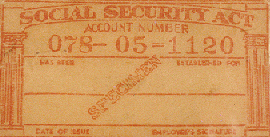Social Security number
Social Security number (SSN) is a nine-digit number issued to U.S. citizens, permanent residents, and temporary (working) residents under section 205(c)(2) of the Social Security Act, codified as 42 U.S.C. § 405(c)(2). The number is issued to an individual by the Social Security Administration (SSA), an agency of the federal government. Its primary purpose is to track individuals for Social Security purposes, but it has also become a de facto national identification number for taxation and other purposes.
History[edit | edit source]
The Social Security number was created in 1936 as part of The New Deal to serve as an account number for the administration of the Social Security program. Initially, SSNs were intended solely to track earnings and eligibility for Social Security benefits. However, over time, the SSN has been adopted for a wide range of purposes beyond its original social insurance function, including to track individuals for taxation, credit reporting, and identification.
Structure[edit | edit source]
A Social Security number is composed of three parts: the area number, the group number, and the serial number. The area number reflects the state in which the SSN was issued. This part of the SSN has undergone changes over time, especially with the introduction of the SSN randomization policy in 2011, which eliminated the geographical significance of the first three digits. The group number is the middle two digits and does not hold any specific geographical or chronological significance. The serial number is the last four digits and is issued sequentially within each group number.
Uses[edit | edit source]
While the original purpose of the SSN was to track workers' earnings and eligibility for Social Security benefits, its use has expanded significantly. Today, SSNs are required for a wide range of activities, including opening a bank account, obtaining credit, enrolling in Medicare, and filing a tax return. The widespread use of SSNs as a de facto national identification number has raised privacy and security concerns, particularly in relation to identity theft.
Privacy and Security Concerns[edit | edit source]
The extensive use of Social Security numbers has led to increased risks of identity theft and fraud. In response, there have been calls for greater protection of individuals' SSNs and for the development of alternative methods of identification and authentication. Various laws, such as the Privacy Act of 1974 and the Identity Theft and Assumption Deterrence Act, have been enacted to provide some protections.
Future of the Social Security Number[edit | edit source]
Debate continues about the role of the Social Security number in American society, with some advocating for its replacement or the introduction of additional secure forms of identification. The Social Security Administration and other federal agencies have been exploring ways to enhance the security of SSNs and to reduce their misuse.
This article is a government-related stub. You can help WikiMD by expanding it!
Search WikiMD
Ad.Tired of being Overweight? Try W8MD's NYC physician weight loss.
Semaglutide (Ozempic / Wegovy and Tirzepatide (Mounjaro / Zepbound) available. Call 718 946 5500.
Advertise on WikiMD
|
WikiMD's Wellness Encyclopedia |
| Let Food Be Thy Medicine Medicine Thy Food - Hippocrates |
Translate this page: - East Asian
中文,
日本,
한국어,
South Asian
हिन्दी,
தமிழ்,
తెలుగు,
Urdu,
ಕನ್ನಡ,
Southeast Asian
Indonesian,
Vietnamese,
Thai,
မြန်မာဘာသာ,
বাংলা
European
español,
Deutsch,
français,
Greek,
português do Brasil,
polski,
română,
русский,
Nederlands,
norsk,
svenska,
suomi,
Italian
Middle Eastern & African
عربى,
Turkish,
Persian,
Hebrew,
Afrikaans,
isiZulu,
Kiswahili,
Other
Bulgarian,
Hungarian,
Czech,
Swedish,
മലയാളം,
मराठी,
ਪੰਜਾਬੀ,
ગુજરાતી,
Portuguese,
Ukrainian
Medical Disclaimer: WikiMD is not a substitute for professional medical advice. The information on WikiMD is provided as an information resource only, may be incorrect, outdated or misleading, and is not to be used or relied on for any diagnostic or treatment purposes. Please consult your health care provider before making any healthcare decisions or for guidance about a specific medical condition. WikiMD expressly disclaims responsibility, and shall have no liability, for any damages, loss, injury, or liability whatsoever suffered as a result of your reliance on the information contained in this site. By visiting this site you agree to the foregoing terms and conditions, which may from time to time be changed or supplemented by WikiMD. If you do not agree to the foregoing terms and conditions, you should not enter or use this site. See full disclaimer.
Credits:Most images are courtesy of Wikimedia commons, and templates, categories Wikipedia, licensed under CC BY SA or similar.
Contributors: Prab R. Tumpati, MD




